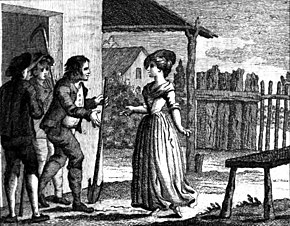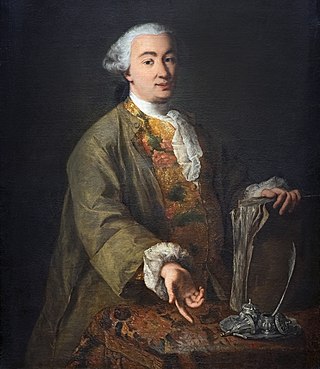
Carlo Osvaldo Goldoni was an Italian playwright and librettist from the Republic of Venice. His works include some of Italy's most famous and best-loved plays. Audiences have admired the plays of Goldoni for their ingenious mix of wit and honesty. His plays offered his contemporaries images of themselves, often dramatizing the lives, values, and conflicts of the emerging middle classes. Though he wrote in French and Italian, his plays make rich use of the Venetian language, regional vernacular, and colloquialisms. Goldoni also wrote under the pen name and title Polisseno Fegeio, Pastor Arcade, which he claimed in his memoirs the "Arcadians of Rome" bestowed on him.

Baldassare Galuppi was a Venetian composer, born on the island of Burano in the Venetian Republic. He belonged to a generation of composers, including Johann Adolph Hasse, Giovanni Battista Sammartini, and C. P. E. Bach, whose works are emblematic of the prevailing galant music that developed in Europe throughout the 18th century. He achieved international success, spending periods of his career in Vienna, London and Saint Petersburg, but his main base remained Venice, where he held a succession of leading appointments.

La clemenza di Tito, K. 621, is an opera seria in two acts composed by Wolfgang Amadeus Mozart to an Italian libretto by Caterino Mazzolà, after Pietro Metastasio. Mozart began the work while he was finishing Die Zauberflöte, the last of his principal operas. La clemenza di Tito premiered on 6 September 1791 at the Estates Theatre in Prague.
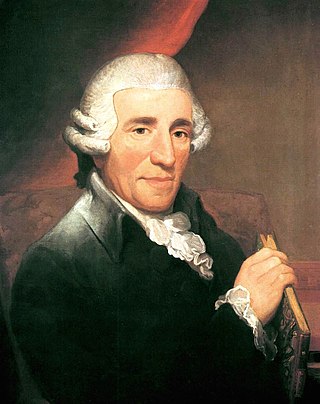
Il mondo della luna, Hob. XXVIII:7, is an opera buffa by Joseph Haydn with a libretto written by Carlo Goldoni in 1750, first performed at Eszterháza, Hungary, on 3 August 1777. Goldoni's libretto had previously been set by six other composers, first by the composer Baldassare Galuppi and performed in Venice in the carnival of 1750. It was then adapted for Haydn's version of the opera, which would be performed during the wedding celebrations of Count Nikolaus Esterházy, the younger son of Haydn's patron, Prince Nikolaus Esterházy, and the Countess Maria Anna Wissenwolf. It is sometimes performed as a singspiel under its German title Die Welt auf dem Monde.

La buona figliuola, or La Cecchina, is an opera buffa in three acts by Niccolò Piccinni. The libretto, by Carlo Goldoni, is based on Samuel Richardson's novel Pamela; or, Virtue Rewarded. This was Piccinni's most successful Italian opera. There was a sequel entitled La buona figliuola maritata (1761) by the same composer and librettist. La buona figliuola supposta vedova by Gaetano Latilla followed in 1766.
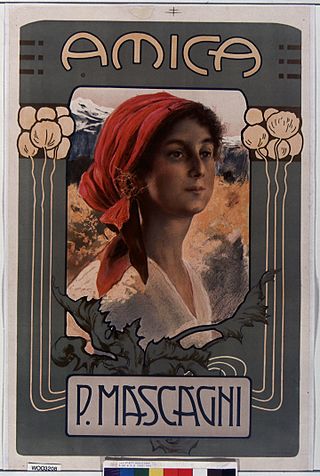
Amica is an opera in two acts by Pietro Mascagni, originally composed to a libretto by Paul Bérel. The only opera by Mascagni with a French libretto, it was an immediate success with both the audience and the critics on its opening night at the Théâtre du Casino in Monte-Carlo on 16 March 1905. Mascagni himself conducted the performance. The opera had its Italian premiere on 13 May 1905 at the Teatro Costanzi in Rome.

L'anima del filosofo, ossia Orfeo ed Euridice, Hob. 28/13, is an opera in Italian in four acts by Joseph Haydn and is one of the last two operas written during his life, the other being Armida (1783).The libretto, by Carlo Francesco Badini, is based on the myth of Orpheus and Euridice as told in Ovid's Metamorphoses. Composed in 1791 for His Majesty's Theatre during his first visit to England, the opera was never performed during Haydn's lifetime and only given its formal premiere in 1951.
Il Mitridate Eupatore is an opera seria in five acts by the Italian composer Alessandro Scarlatti with a libretto by Girolamo Frigimelica Roberti. It was first performed, with the composer conducting, at the Teatro San Giovanni Grisostomo, Venice, on 5 January 1707. A failure at its premiere, Mitridate Eupatore is now considered one of the finest of Scarlatti's operas.
Gennaro Astarita was an Italian composer, mainly of operas. The place of his birth is unknown, although he was active in Naples for many years. He began his operatic career in 1765, collaborating with Niccolò Piccinni in the writing of the opera L'orfana insidiata. He became the maestro di cappella in Naples in 1770.
La Lodoiska is an opera in three acts by Simon Mayr to an Italian libretto by Francesco Gonella De Ferrari. It was Mayr's second opera and premiered at La Fenice in Venice on 26 January 1796.
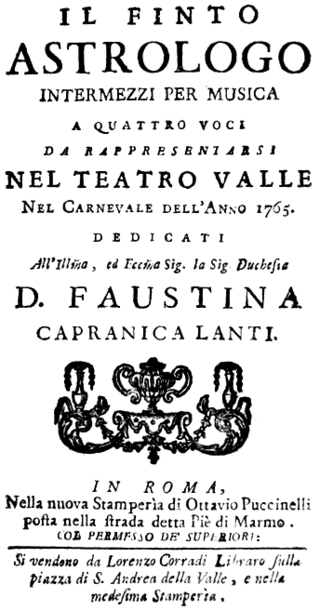
Il finto astrologo is an intermezzo by composer Niccolò Piccinni. The opera uses an Italian-language libretto by Carlo Goldoni. The work premiered at the Teatro Valle in Rome on 7 February 1765 with a cast that included the famous castrato Venanzio Rauzzini as Clarice.

Il prigionier superbo is an opera seria in three acts, composed by Giovanni Battista Pergolesi to a libretto attributed to Gennaro Antonio Federico, and based on an earlier libretto by Francesco Silvani for Gasparini's opera, La fede tradita e vendicata. It was premiered at the Teatro San Bartolomeo in Naples on 5 September 1733 and received further performances in October. The opera, with its labyrinthine plot involving the rivalry of Metalce and Viridate for the hand of Rosmene, soon sank into oblivion, but its comic intermezzo, La serva padrona was to achieve considerable success when performed on its own.
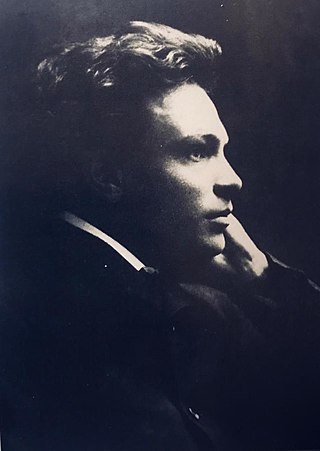
Semirâma is an opera in three acts by Ottorino Respighi to a libretto by Alessandro Cerè based on Voltaire's 1748 play Sémiramis, the same subject used for Rossini's Semiramide. Semirâma premiered on 20 November 1910 at the Teatro Comunale di Bologna. The première obtained a great success, with several calls for the composer and the singers.

La bella dormente nel bosco is an opera in three acts by Ottorino Respighi to a libretto by Gian Bistolfi based on Charles Perrault's fairy tale "Sleeping Beauty".

Il mondo della luna is an opera in 3 acts by Baldassare Galuppi. The Italian-language libretto was by Carlo Goldoni. It premiered on 29 January 1750 at the Teatro San Moisè, Venice.

La diavolessa is an opera in 3 acts by Baldassare Galuppi. The Italian-language libretto was by Carlo Goldoni. It premiered in November 1755 at the Teatro San Samuele, Venice.
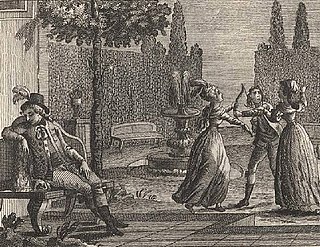
Gustavo primo, re di Svezia is a three act opera seria by Baldassare Galuppi, with a libretto by Carlo Goldoni, fictionalising events in the life of Gustav I of Sweden. Composed in honour of the Genoese nobleman marchese Giovanni Giacomo Grimaldi, it premiered on 25 May 1740 at Venice's Teatro San Samuele. It was first recorded in 2003 by Edit Károly, Mónika Gonzalez, Mario Cecchetti, Gabriella Létai Kiss, Filippo Pina Castiglioni, and the Savaria Baroque Orchestra, conducted by Fabio Pirona.
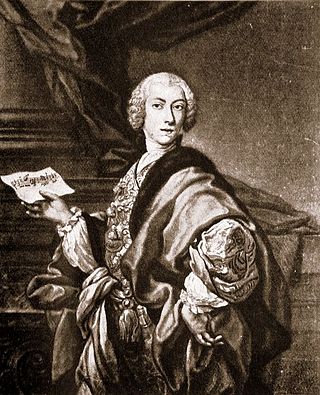
For Giovanni Battista Pergolesi's L'Olimpiade, see L'Olimpiade (Pergolesi)
